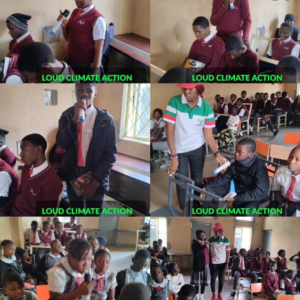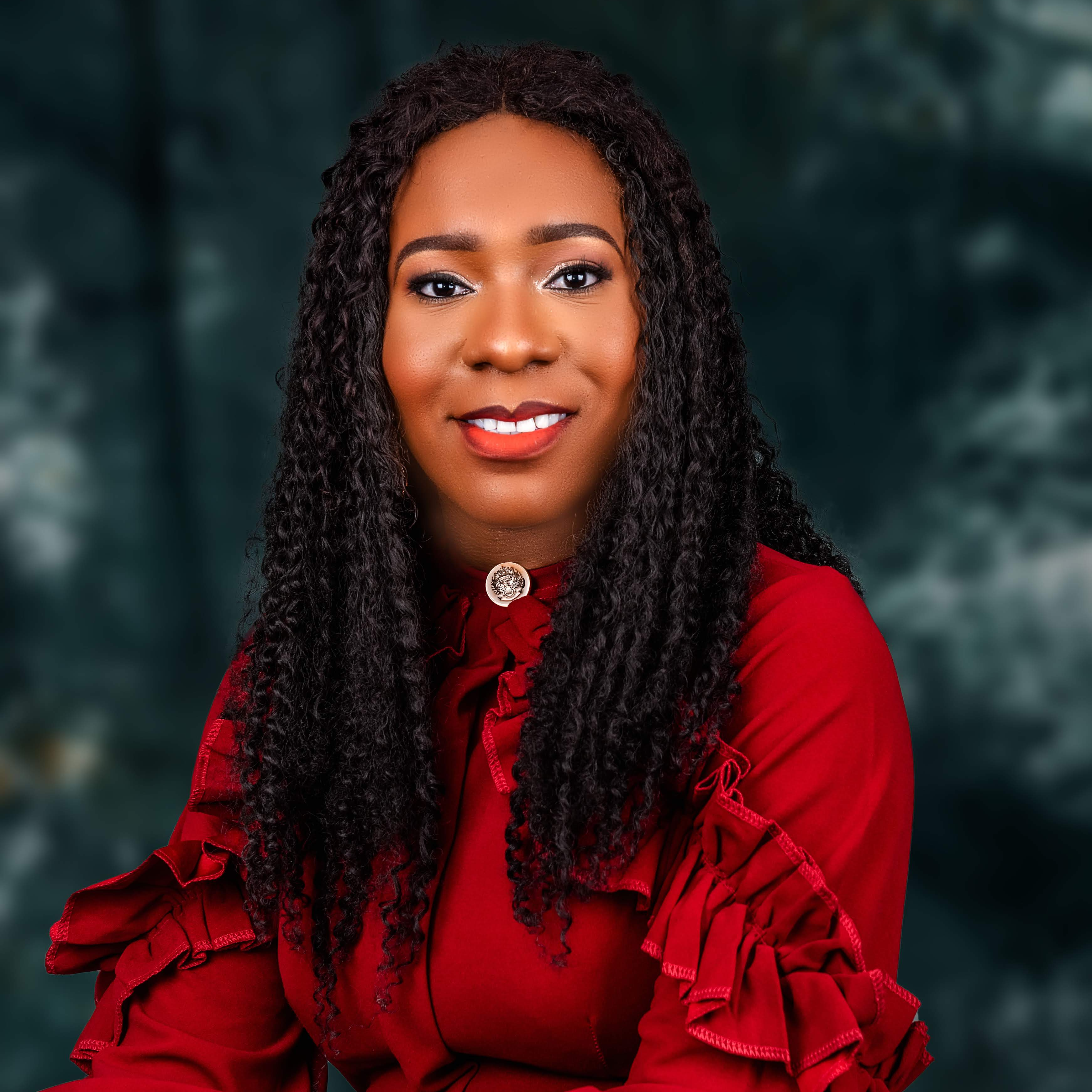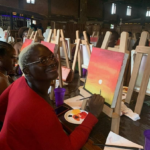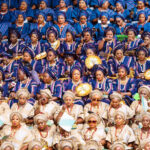Rifkatu Joseph Odeyemi’s mission is clear: to equip the next generation with the tools to tackle one of the world’s most pressing challenges—climate change.
Her journey began with a Saturday morning ritual in Bompai, Kano State, led by her father. Growing up in a family of seven, Rifkatu’s father instilled in his children the importance of caring for their surroundings—a lesson that would later shape her life’s work.
Every Saturday, her father gathered the family for a neighbourhood cleanup, extending beyond their compound to their neighbours’ homes. “I used to wonder why we had to clean other people’s surroundings,” Rifkatu recalls. “But he always said that if our neighbours didn’t take care of their environment, it would eventually affect us.” This hands-on, community-centred approach became a cornerstone of her identity. While she didn’t fully appreciate it as a child, she now sees the profound wisdom in her father’s teachings.
Rifkatu’s sense of responsibility flourished during her National Youth Service Corps (NYSC) experience. Stationed in Kano State, she worked as a peer educator, speaking to students about education and hygiene. Despite her academic background in microbiology from the University of Jos, she found herself increasingly drawn to environmental issues, realising how interconnected they were with human health and well-being.
“I didn’t want to just earn a salary,” she explains. “I wanted to make a mark, to give back.” This desire to leave a lasting impact, combined with her father’s lessons, propelled her into climate advocacy.
Today, Rifkatu is the founder of LOUD Climate Action, a nonprofit dedicated to making climate change relatable and urgent for Nigerian youths, especially those in secondary schools. Through LOUD, she has found her purpose in shaping young minds, helping them understand the importance of environmental sustainability and their role in protecting the planet.
LOUD Climate Action focuses on educating students about sustainability, the circular economy, and climate change. “If you know better, you do better,” Rifkatu often says, underscoring the critical role of education in shaping future generations’ approach to the environment. By reaching students early, she hopes to instil a culture of environmental consciousness that will stay with them for life.
Interacting with young people is where Rifkatu feels most in her element. Every engagement reaffirms her belief in the importance of environmental education and advocacy. “One of my best moments was when I revisited a school and overheard students talking about climate change like it was part of their daily conversations,” she recalls. “They had taken ownership of the conversation. That’s when I knew we had succeeded.”
However, Rifkatu’s work goes beyond teaching the science of climate change. Her eco-clubs foster leadership and life skills, encouraging students to take on roles, organize events, and manage projects—skills essential for both environmental stewardship and future careers. “We’re not just preparing them to understand climate change. We’re preparing them for life,” she says.

In addition to education, Rifkatu is passionate about renewable energy and waste management. “Northern Nigeria is rich in sunlight. We have the resources—why aren’t we using them?” she asks. Her work also promotes reducing waste, reusing resources, and recycling—small steps she believes can lead to monumental collective impact.
Collaboration is central to Rifkatu’s approach. She emphasises the need for partnerships between governments, industries, and communities to create lasting solutions. Her goal is to raise a generation of leaders who see economic progress as inseparable from environmental stewardship.
Despite Nigeria’s challenges in combating climate change, Rifkatu is optimistic. She points to progress in renewable energy initiatives, afforestation efforts, and the country’s Climate Change Act of 2021, which aims for net-zero carbon emissions by 2050. However, she acknowledges that implementation is often slow. “We have good policies in place, but enforcement has been a challenge,” she notes.
Looking ahead, Rifkatu envisions herself as a global leader in climate action. Over the next decade, she plans to deepen her involvement in policy innovation and advocacy, particularly in shaping strategies that balance climate resilience with socioeconomic development in vulnerable communities across Africa. LOUD Climate Action will continue expanding, driving education programs and mobilizing grassroots movements to scale sustainable solutions.
Rifkatu draws inspiration from climate leaders like Christiana Figueres, whose leadership helped secure the Paris Agreement; Wangari Maathai, whose Green Belt Movement combined environmental action with social equity; and Greta Thunberg, who has pushed for global accountability in climate action. These figures fuel her belief that young people must be at the forefront of the climate movement—a conviction that drives her work with LOUD Climate Action.
While she’s inspired by international innovations, like sugarcane-based alternatives to plastic used in India, Rifkatu is pragmatic about Nigeria’s transition to sustainability. She advocates for a gradual shift from harmful practices, urging the development of alternatives rather than sudden bans.
Challenges, especially funding, remain significant. Despite the availability of grants in the climate space, the associated requirements can be prohibitive. As a result, many of Rifkatu’s projects are self-funded, relying on the support of family, friends, and her network. To date, she has reached around 2,000 students through her climate advocacy, and while her work with other groups like teachers and women is less documented, her impact is growing.
For Rifkatu, success is measured not only by students’ knowledge of climate change but by the sustainability of her projects and the life skills they foster in young people. “We teach them that success in life depends as much on soft skills—like time management and initiative—as on academic qualifications,” she says.
Her efforts have not gone unnoticed. Rifkatu was awarded the ActionAid Nigeria Women Climate Champion Award for her commitment to advancing climate action. Yet, she insists her greatest reward comes from the smiles of the students she teaches and the lasting impact of her work.
Rifkatu is also writing a book, Circular Economy: God’s Initial Design, which explores the concept of a circular economy through a faith-based lens. In it, she draws parallels between biblical principles and sustainable practices, arguing that God’s creation was designed to be self-sustaining—a concept she urges humanity to embrace.
Though her journey is far from over, Rifkatu is clear about the path ahead. Her work will continue to blend advocacy, education, and collaboration, always rooted in the belief that every action counts in the fight for a sustainable future.
Rifkatu Joseph Odeyemi is committed to empowering the next generation to tackle climate change. Instilled with a sense of environmental responsibility by her father, who emphasized community cleanups, Rifkatu's passion was further nurtured during her National Youth Service Corps experience. She founded LOUD Climate Action, a nonprofit dedicated to climate education for Nigerian youths, particularly secondary school students. The organization focuses on sustainability, the circular economy, and fostering leadership skills essential for environmental stewardship.
Rifkatu is an advocate for renewable energy and waste management, emphasizing the abundant sunlight in Northern Nigeria. Collaboration among governments, industries, and communities is central to her strategy. Despite challenges like slow policy implementation and funding obstacles, she remains optimistic about Nigeria's progress. Inspired by leaders like Christiana Figueres and Greta Thunberg, Rifkatu envisions global leadership and deeper policy involvement in the future.
Her educational initiatives have reached around 2,000 students, with an emphasis on both climate knowledge and life skills. Recognized as a climate champion, Rifkatu is also writing a book intertwining sustainability with biblical principles. Her work continues to be guided by the belief that every action makes a difference in achieving a sustainable future.






